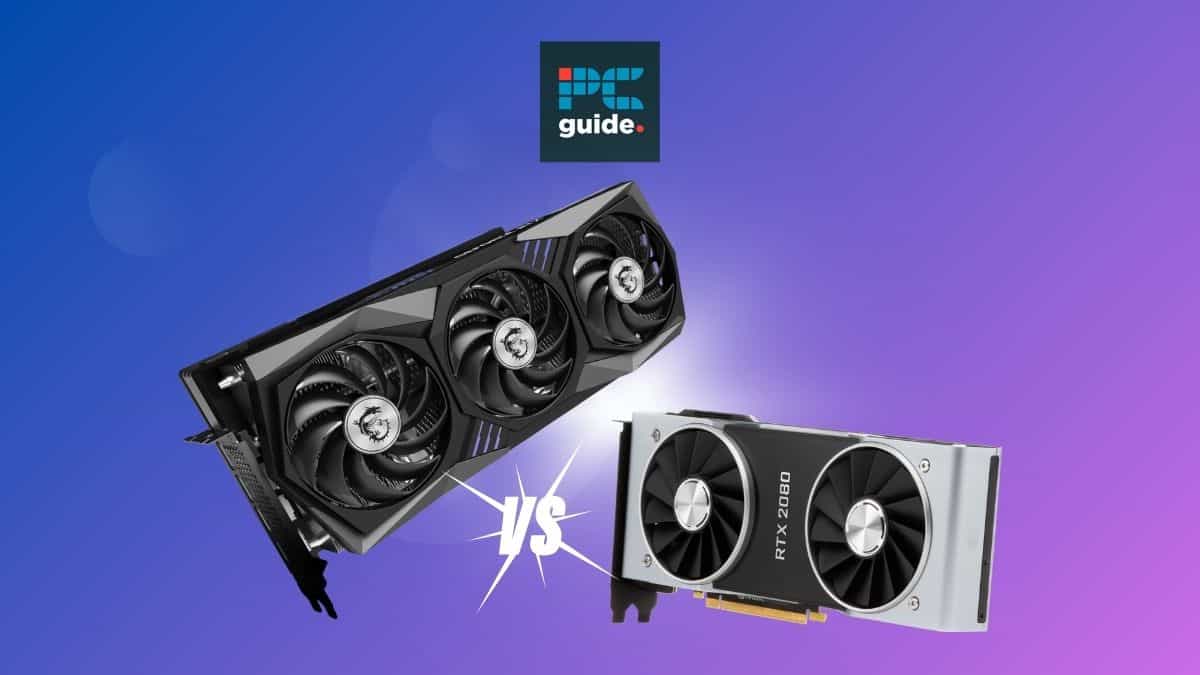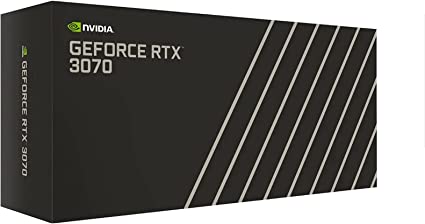Nvidia RTX 2080 vs Nvidia RTX 3070 – which wins?

Table of Contents
If you’re on the lookout for a new graphics card but trying to stay conscious of budget, purchasing an older, cheaper model may be the right option for you. In this article, we take a look at two of Nvidia’s older GPUs in our comparison of Nvidia RTX 2080 vs Nvidia RTX 3070. We consider their basic parameters; comparing their specs, performance, and price.
If you’re keen to check out some of our other GPU comparison guides, here’s our RTX 3060 vs RTX 3070 and our RTX 2080 vs RTX 3060 comparison guides.
Nvidia RTX 2080 vs Nvidia RTX 3070 – specs at a glance
| Specifications | Nvidia RTX 2080 | Nvidia RTX 3070 |
|---|---|---|
| Cores | 2944 | 5888 |
| TMUs | 184 | 184 |
| Memory size | 8 GB GDDR6 | 8 GB GDDR6 |
| Memory Bus | 256 bit | 256 bit |
| Bandwidth | 448.0 GB/s | 448.0 GB/s |
| Base Clock | 1515 MHz | 1500 MHz |
| Boost Clock | 1710 MHz | 1725 MHz |
| RT Cores | 46 | 46 |
| MSRP | $699 | $499 |
| TDP | 215 W | 220 W |
Specifications comparison
The RTX 3070, powered by Nvidia’s cutting-edge Ampere architecture, represents a significant leap over the Turing-based RTX 2080. This evolution is not just about numbers; it’s about what these numbers mean for PC gamers and creators alike.
With the Nvidia Geforce RTX 3070 boasting an impressive 5888 CUDA cores, (double that of the 2080) the difference is stark. This massive increase translates into markedly superior performance, particularly in demanding 1440p scenarios. Ampere’s prowess is evident, enabling the 3070 to handle intricate environments and effects with ease and efficiency.
Clock speed, while only slightly higher in the 3070, complements its core count advantage, pushing it to deliver smoother and more responsive gaming experiences. And while both GPUs feature the same number of RT cores, the 3070’s are built on a newer, more advanced generation, offering superior ray tracing capabilities that bring games to life with stunning realism.
The RTX 3070 doesn’t just edge out the 2080 in performance; it does so at a more attractive price point. With its advanced architecture, greater core count, enhanced ray tracing, and higher resolution capabilities the RTX 3070 emerges as the clear victor. It’s not merely a better GPU; it’s a gateway to the next level of gaming and content creation, offering unparalleled value and performance in today’s market.
Performance comparison
Leveraging its superior specs, the Nvidia RTX 3070 unequivocally sets a new standard for gaming performance, eclipsing the RTX 2080 across the board. This Nvidia GPU’s advancements in architecture, memory clock speed, and ray tracing technology aren’t just theoretical improvements; they translate directly into tangible, measurable gains in better performance.
Public benchmarks offer compelling evidence of the 3070’s dominance. In synthetic test results, the RTX 3070 outpaces the 2080 by an impressive 20%, a margin that underscores the significant leap forward represented by Nvidia’s Ampere architecture. Passmark scores echo this disparity, further cementing the 3070’s status as the superior GPU.
When it comes to gaming, the arena where these differences matter most, the RTX 3070 continues to outshine its predecessor. Averaging a 15% improvement in frame rates across a variety of titles, the 3070 ensures gamers can enjoy ultra settings at 1440p with smoother, more immersive gameplay. This performance boost is a testament to the 3070’s more advanced RT cores and higher clock speeds, offering a richer gaming experience that the 2080 simply can’t match.
Price comparison
At launch, the Nvidia RTX 2080 hit the market with an MSRP of $699, positioning it as a premium choice with less power. In contrast, the RTX 3070 was introduced at a more accessible $499, making it $200 less expensive than its predecessor while promising superior performance.
In the current market, finding a new RTX 2080 has become challenging, with prices for available units fluctuating but occasionally dipping below $340. Meanwhile, the RTX 3070, despite being the newer and more powerful option, maintains a price floor of around $400.
This pricing dynamic emphasizes a shift in value perception. The extra cost for the RTX 3070 is justified by its enhanced performance, efficiency, and features like advanced ray tracing and DLSS support. Essentially, with the 3070, you’re investing in a more future-proof solution that delivers on the promise of better gaming and productivity experiences, validating the higher expenditure for a significantly upgraded GPU.
Value
When sold on it’s own the RTX 3070 appears to be significantly better in value, but it’s important to remember that the £100 difference may become more of a budgeting factor if other PC components are bought at the same time. Building a rig can be pricey and if a lower price overall is something you’re looking for its good to figure out what’s worth spending the most money on; whether its CPUs, GPUs, monitors etc.
Nvidia RTX 2080 vs Nvidia RTX 3070 – which is better?
In the face-off between the RTX 2080 and RTX 3070, the 3070 emerges as the unequivocal victor, offering a leap in performance that justifies its price tag. With its Ampere architecture, the 3070 not only surpasses the 2080 in gaming and synthetic benchmarks but does so at a price that represents substantial value for today’s gamers and creators.
Nvidia RTX 2080 vs Nvidia RTX 3070 – conclusion
Although the 3070 does surpass the 2080 in performance and value, both graphics cards remain valuable parts of the Nvidia GPU lineup. The 2080 once reigned supreme, however, the advancements and affordability of the 3070 make it the clear choice for those seeking the best blend of price, performance, and future readiness in their graphics card selection.


